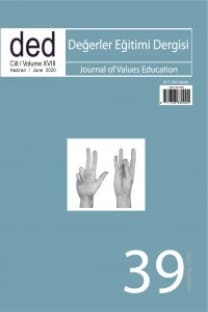Ontolojiden Epistemolojiye Pratik Hikmet Merkezli Bir Okuma
Bu makale, ilkin Aristoteles’in pratik hikmet (phronesis) kavramı ile yine onun nefs teorisinin, aynı anlatının iki farklı yüzü olduğunu göstermeyi hedefler. Sonra modern düşünce anlatısının Varlık’tan dolayısıyla ontolojiden bilgi teorisine nasıl kaydığını takip etmeyi, Aristoteles’in nefs teorisi üzerinden okumayı dener. Aristoteles pratik hikmet (phronesis) kavramında, düşünce erdemiyle karakter erdemini; düşünsel olan ile dini veya mitsel olanı; idrak gücüyle motivasyon/hareket yetisini; ontolojiyle epistemolojiyi birleştirebilmiştir.
Anahtar Kelimeler:
Nefs Teorisi, Pratik Hikmet, Modern Epistemoloji, Aristotles, Ontoloji
From Ontology to Epıstemology A Practical Wisdom-Focused Reading
This study, first attempts to show that Aristotle's concept of practice (phronesis) and his theory of soul/nefs are two sides of the same coin. Aristotle, in the concept of practical wisdom (phronesis), considers the virtue of character with the virtue of thoughtfulness; the intellectual and the religious or the mythical; motivation/action ability with cognitive power. So he was able to combine ontology and epistemology.
Keywords:
Nafs/Soul Theory Aristotle, Ontology, Modern Epistemoloji, Modern Epistemology, Practical Wisdom,
___
- Arendt, H. (1997). Şiddet üzerine. (B. Peker, Çev.). İletişim Yayınları.
- Aristotle, N. (1962). Nicomachean ethics. (M. Ostwald, Çev.). Prentice Hall.
- Asad, T. (2003) Formations of the secular, Christianity, Islam, modernity, Stanford University Press.
- Bernstein, R. J. (1985). From hermeneutics to praxis' In: Hermeneutics and praxis. University of Notre Dame Press.
- Caputo, J. D. (2003). The Experience of God. In M. A. Wrathall (Ed.). Religion after metaphysics. Cambridge University Press.
- Çınar, A. (2006). Modern zamanların değer arayışı: Varlık-bilgi-değer birliğinin önemi. Değerler Eğitimi Dergisi, 4(11), 53-68.
- Çınar, A. (2021). Deizmin kısa tarihi. Paradigma Akademi Yayınları.
- Çınar, A. (2013). Değerler felsefesi ve psikolojisi. Emin Yayınları.
- Durkheim, E. (1986). Meslek ahlakı. (M. Karasan, Çev.). MEB Yayınları.
- Dumery, H. (2001). Din felsefesi yazıları-I. (Z Özcan, Çev.). Sentez Yayınları.
- Gadamer, H. G. (1988). The problem of historical consciousness. In P. Rabinow & W. M. Sullivan (Eds.) Interpretive social science a second look. University of California Press.
- Gadamer, H. G. (1995). Truth and method. (J. Weinsheimer & D. G. Marshall, Trans.) Continuum.
- Heidegger, M. (2002). Heidegger on the art of teaching, In (V. Allen ve D. Axiotis, Trans.), Heidegger, education and modernity. Rowman & Littlefield Publishers.
- Heidegger, M. (2013). Martin, düşünmek ne demektir? (R. Şentürk, Çev.). Paradigma Yayınları.
- Rorty, R. (1996). Philosophy and the mirror of nature. Blackwell, Oxford&Cambridge.
- Schmitt, C. (2002). Siyasi ilahiyat. (E. Zeybekoğlu, Çev.). Dost Kitapevi.
- MacIntyre, A. (1984). After virtue: A study in moral theory. University of Notre Dame Press.
- Tillich, P. (1963). Morality and beyond. Harper & Row.
- Tillich, P. (2006). Ahlak ve Ötesi. (A. Çınar, Çev.). Elis Yayınları.
- Ross, D. (2002). Aristoteles. (A. Arslan, O. Anar, Ö. Kavasoğlu, Z. Kurtoğlu, Çev.) Kabalcı Yayınevi.
- Rüşd, İ. (1998). Ez-zarûrî fî’s iyâse, (A. Şehlân, Çev.). Beyrut Merkezu Dirasati’l-Vahdeti’l-Arabiyye.
- Leibniz, G. W. (1993). Theodicy. (E.M. Huggard, Trans.). Open Court Publishing Company.
- Kılıç, M. (2008, Ekim, 09-11). Felsefi etik açıdan İbn Rüşd’ün hukuk düşüncesinin temellendirilmesi [Sözlü sunum]. Doğu-Batı İlişkisinin Entelektüel Boyutu: Uluslararası İbn Rüşd Sempozyumu, Sivas, Türkiye.
- Kitagawa, J. M. (2001). Tanrı (Theos), Mitos ve Logos. (A. Çınar, Çev.). Uludağ Üniversitesi İlahiyat Fakültesi Dergisi, 10(1), 261-271.
- Latour, B. (1993). We have never been modern. (Catherine Porter, Trans.) Harvard University Press.
- Warnke, G. (1987). Gadamer, hermeneutics, tradition and reason. Stanford University Press.
- ISSN: 1303-880X
- Yayın Aralığı: Yılda 2 Sayı
- Başlangıç: 2003
- Yayıncı: Ensar Neşriyat Ticaret A.Ş.
Sayıdaki Diğer Makaleler
İlkokul Öğrencilerinin Değerlere Bakış Açılarının Kök Değerler Açısından İncelenmesi
Değerleri Kazandırmada Drama Yönteminin Etkisi: Bir Meta Analiz Çalışması
Saide ÖZBEY, Filiz ERATA, Kudret YAVUZ
Sınıf Öğretmeni Adaylarına Göre Geleneksel Çocuk Oyunları
Mustafa EROL, Mehmet Umut AKBAKLA, Nuray KARABIÇAK
Ahmet Celalettin GÜNEŞ, Hilal KURTÇA, Ayşenur BARAK
